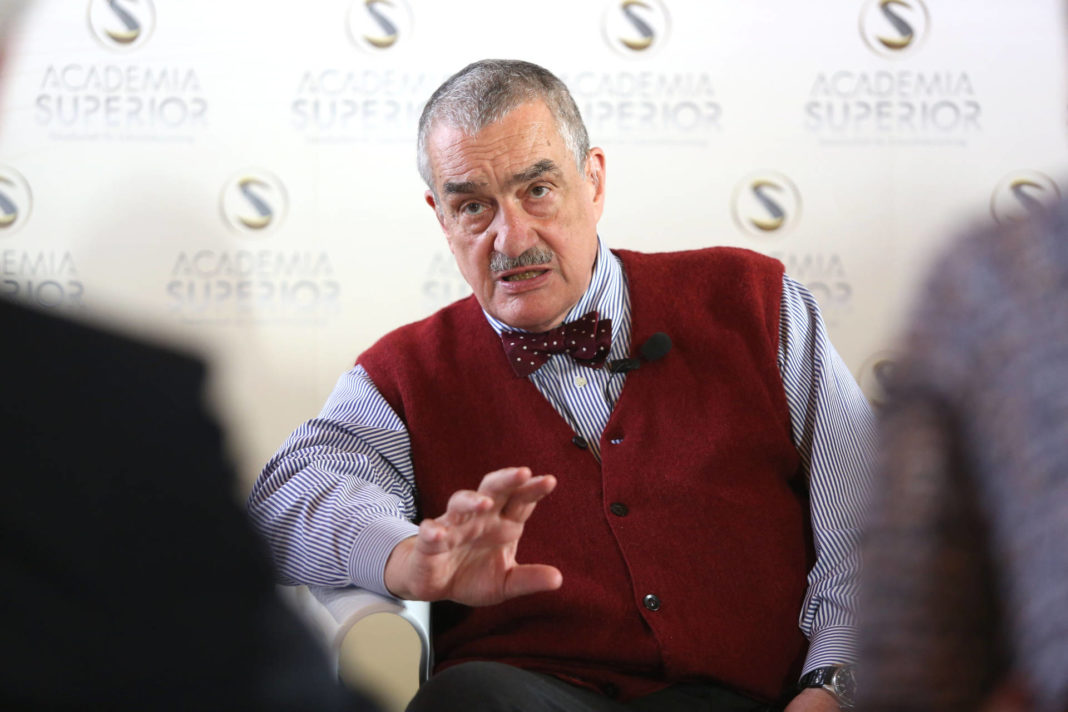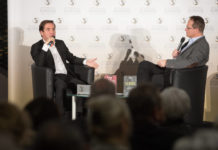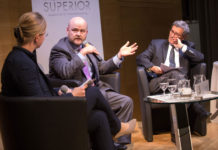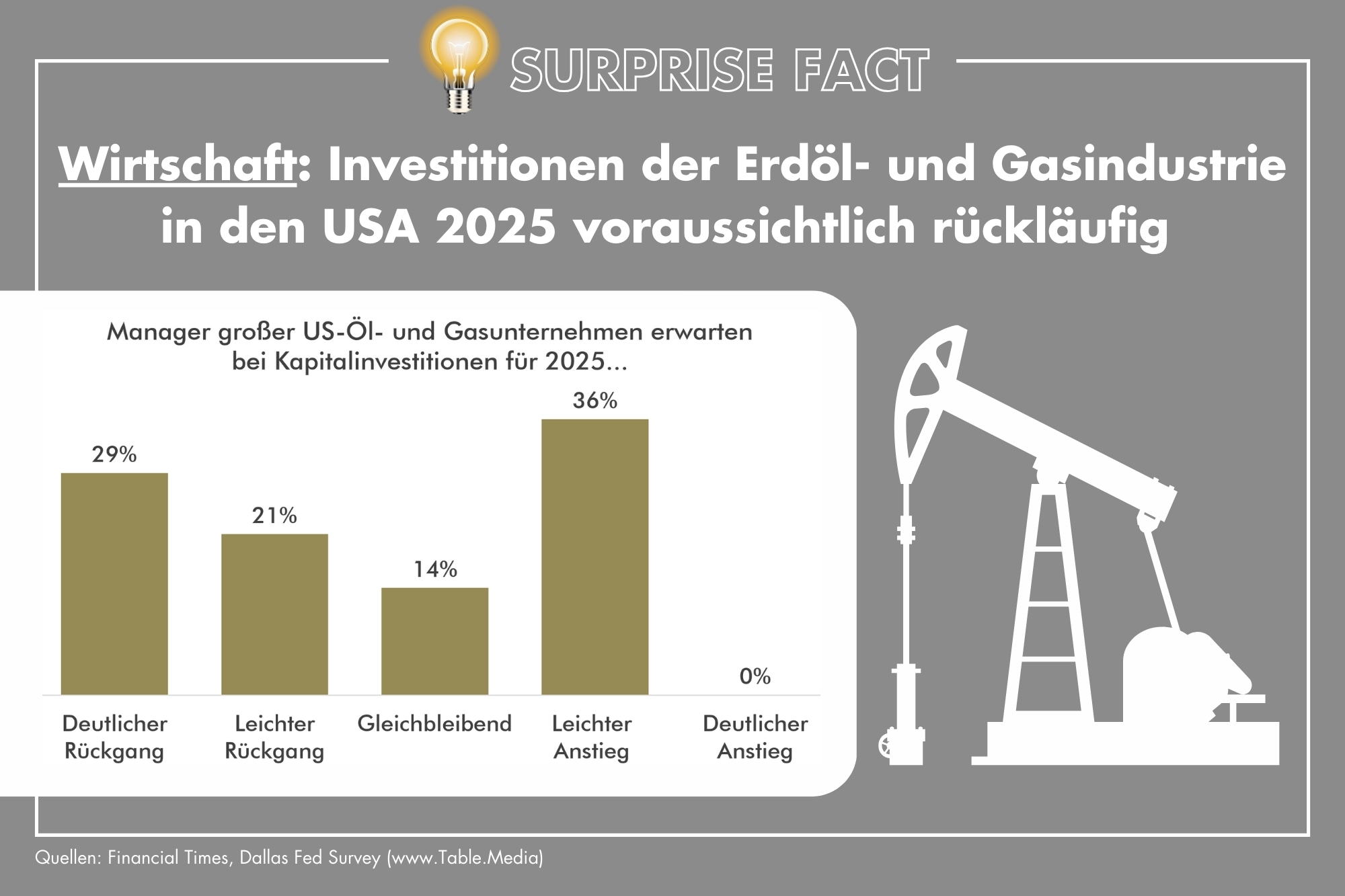Karel Schwarzenberg, born in 1937, has seen many political boundaries emerge and disappear in his life. Schwarzenberg is rooted in the whole of Central Europe and therefore „boundless”. In 1989 Schwarzenberg was awarded the human Rights Award of the Council of Europe for his international engagement for human rights. From 1990 to 1992 he was Czech Chancellor under Václav Havel. Between 2007–2009 and 2010–2013 he was Czech Foreign Minister and he is still one of the most popular politicians in the Czech Republic.
He was in Gmunden as an expert at the SURPRISE FACTORS SYMPOSIUM 2014 and talked about the future of Europe, political boundaries and parties, about which crises are ahead of us and what Europe must do to avoid becoming a meaningless peninsula of the Asian continent. Below tthe interview with Karel Schwarzenberg is summarized.
Turn of an era — the period of peace and prosperity in Europe is over
The upturn over the last 25 years in Europe has been remarkable and it was accompanied by a time of peace almost entirely. But this period is over now. The open violation of the law, which Russia committed with the annexation of the Crimea, wiped aside the conventions that have been largely respected in Europe since 1945. In the moment in which a violation of law is accepted, there will be another one following soon. Russia has already occupied Abkhazia and South Ossetia a few years ago — now followed by the Crimea, and perhaps soon by the eastern parts of Ukraine.
Historians say that the short 20th Century lasted from the year 1914 to the year 1989. „Obviously it’s happening again that the 21st Century starts in a ’14 year (…)”, Schwarzenberg said. Since the younger generation doesn’t know what a war is like in reality, many politicians have developed some kind of „trigger happiness”, i.e. the readiness to pull the trigger. One has to take note of this in Europe and start to react adequately to it.
Europe and Austria in a crisis of the old political parties
A symptom of the crisis in Europe is evidenced by the decline of the major democratic parties. Again, an era comes to an end. The formerly dominant Social Democratic and Christian-Social parties are shrinking in all countries and new phenomena begin to dominate the political scene — either the old nationalists or some kind of wide-wing populist parties. Why? Because the politicians of today have forgotten the ideas and roots of their parties. They are all somehow open and liberal, but exchangeable and without intellectual content for which one could be enthusiastic.
The terms „right” and „left” are losing more and more importance and the major ideologies of the past, will finally be a thing of the past soon. At the same time, the distance between „Brussels” and the citizens is increasing. Therefore the interest of the citizens in politics disappears and politicians see their work no longer as a service to their country — which is why the politics of today degenerate more and more into a kind of pure interest policy for one’s own clientele.
The European political system, as it has existed for over 150 years, is coming to an end and there is the risk that, because of the absence of real leaders in Europe, the call for a strong hand increases again. Because after all, the most serious politicians are boring compared to the new populists, at least when you look for entertainment.
Is Europe becoming the Venice of the 21th Century?
The era in which Europe could be sure that it can live comfortably under the American umbrella, is over. Under the protection of the United States, Europe could concentrate on boosting its economy and achieved an unprecedented prosperity for the majority of its inhabitants. But the American interests are more and more focussing on the Pacific region and Europe is not yet capable to defend itself. It has no common security and defense policy and the dangers in and around Europa are rising again. Why should the U.S engage in the Middle East any longer — now that they have become as independent from energy-imports as 100 years ago?
Europe must be „considered” in the world again — a common defense policy is required for that. It also needs a „new” type of politician: less „housekeepers” who just want to obtain the status quo, but personalities who want to guide their nations.
However, it is just as important that Europe has to invest more money in its schools and universities. Too few European universities are among the best of the world. The consequences are already evident: while Europe has exported technical patents to the whole world for over 200 years, it has now become a „patents-importer”. This is the fundamental threat to the future of Europe; because what are we without our knowledge? — Only a peninsula of the Eurasian continent, which is running the risk of sharing the fate of Venice. For several centuries Venice has dominated the Mediterranean — but today it is only interesting for tourists and not because of its politics and economy. Today we see a Europe which is heading inexorably in the same direction.
Quotations:
- „The European political system goes to its natural end.”
- „For 200 years we have been patent-exporters, now we are patent-importers.”
- „We must make Europe considerably in the world.”
- „Great crises produce personalities who can manage them.”
- „The purpose of political leaders? They show their nation the way.”
- „Europe must do something for its own safety.”
- „We have to invest more in our schools and universities.”
Connecting facors for ACADEMIA SUPERIOR
Points for further discussion
- Does Europe have future-proof concepts for its security policy?
- How can European universities become „better”?
- Could borders in Europe have only an administrative function?
- Aggressive expansion policy in Europe
— Which mistakes did the European politics make in the 1930s?
— What would a further division of the Ukraine mean? - How will the political party of the future look like?
Tools for development
- Develop a future scenario: what would change if Europe would get a common military?
- Define basic values of a European foreign policy.
- Define a catalogue: which areas can be decided by the regions in Europe — where is the need for pan-European (framework-) decisions?







